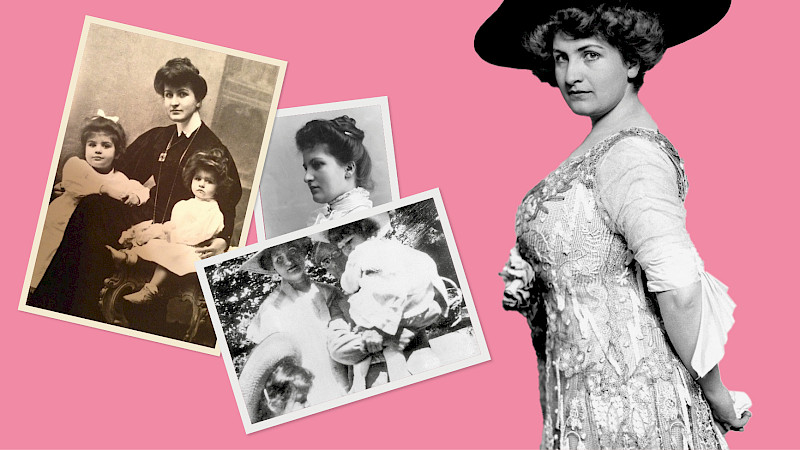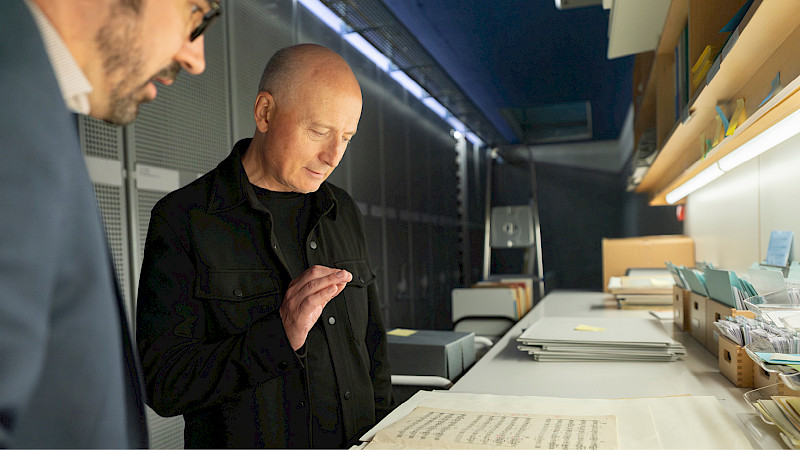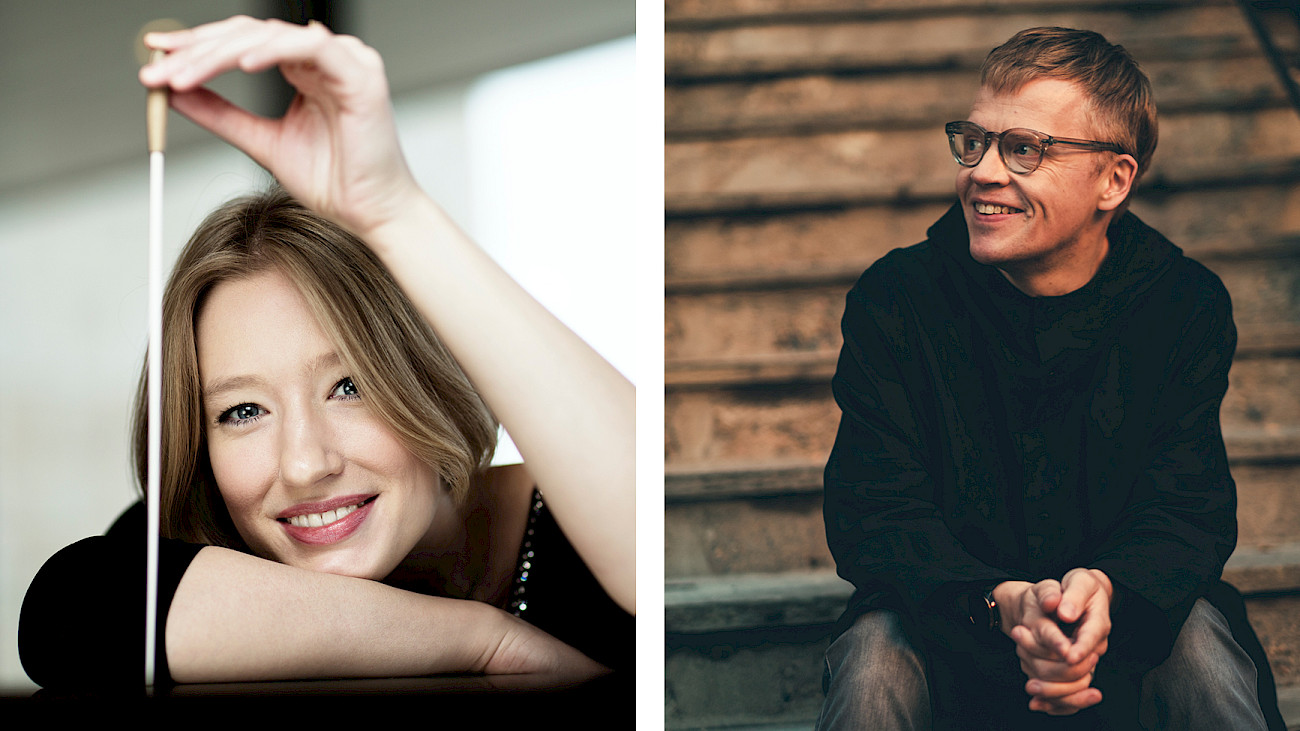
Everything new here
Conductor Joana Mallwitz and violinist Pekka Kuusisto work together for the first time in Bryce Dessner's violin concerto. They are also performing for the first time at the Tonhalle am See. What do such debuts mean?
You are performing together for the first time. Do you prepare for each other?
Joana Mallwitz: The most important thing is that I prepare myself very well for the concert and am then open and permeable to what happens. But of course I know Pekka Kuusisto, I find him to be a very versatile and unusual musician with exciting, unusual programme ideas. I'm really looking forward to finally being on stage with him!
Pekka Kuusisto: Yes, I am preparing myself. Some of my colleagues have already performed with Joana Mallwitz and I've heard that she's brilliant and very nice. She's obviously one of those people who consider it a professional skill to behave like a normal person when working together. And I've watched recordings with her: I like her conducting language - the lights are on, all the time. So I'm really looking forward to this concert. If anything goes wrong, it will be my fault, I already know that.
What do you prefer at a first meeting? That you talk first? Or to start rehearsing straight away?
JM We definitely do a rehearsal without the orchestra first. If you know each other well and have done a work together many times before, that's different; but when you're working together for the first time or on new works, it's important to get to know each other first. We will probably discuss a few basic things before the rehearsal week: How we see the piece, whether there is a tempo framework, questions like that. I will also talk to Bryce Dessner when the concert date gets closer.
PK For me, a meeting before the first rehearsal is very important, especially when the repertoire is new. Bryce Dessner's violin concerto is chamber music, so to speak, and chamber music works better if you've looked each other in the eye beforehand. Even when I conduct myself, which I've been doing more often recently, I sit down with the soloists, even with those I already know well. Some people might say that it's a sign of confidence if you just go into the rehearsal, say hello and then start. But I don't think much of that kind of confidence. There is never any harm that dan be done by talking.
They are giving a concert in the Tonhalle am See for the first time: another debut.
JM At a new venue, you put a lot of trust in the orchestra, which knows the acoustics well. In addition, you naturally hear things about a hall or talk to colleagues who have already been there. I always do this by simply letting the orchestra play during rehearsals and walking around the room - that way I quickly get a feel for how it sounds. The same applies here: you have to be open and engage with the impulses that come in at the moment.
PK Yes, in Zurich I've only ever played in the Tonhalle Maag. Speaking of which, what happened to this hall? It no longer exists? That's a great pity. It would have been a fantastic venue for Bryce Dessner's music. Historic halls are beautiful, but they always put an aesthetic stamp on the music. In the Tonhalle Maag, the music could be what it is. For me, it was an ideal example of how our art form could develop. There are so many empty industrial buildings all over the world. When you consider that new concert halls are being built for 500 million euros and more - you could build dozens of halls in the style of the Tonhalle Maag!
Joana Mallwitz
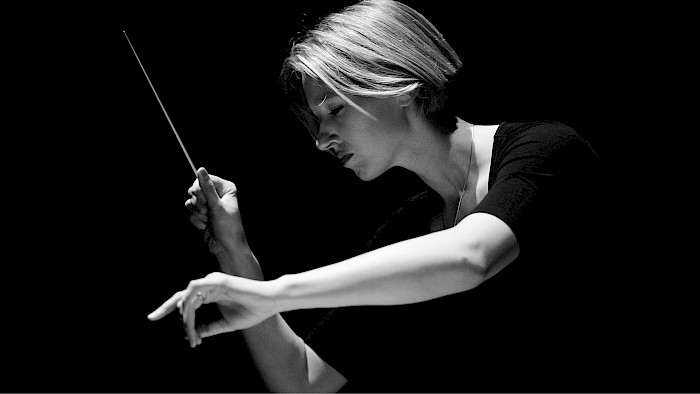
Joana Mallwitz became known to a wide audience when she conducted Mozart's "Così fan tutte" at the Salzburg Festival in 2020. Her musical home at the time was the Nuremberg State Theatre, where she developed the expedition concerts that also became a success online. Since this season, she has been chief conductor and artistic director of the Konzerthausorchester Berlin.
What did you think when you saw the score of Bryce Dessner's violin concerto for the first time?
JM What immediately jumps out at you about this work is that the solo violin plays the whole time. It's less about alternating between solo landscapes and orchestral landscapes, it's really the violin that determines and drives this journey. To a certain extent, the piece is about a hike to Santiago de Compostela, and that immediately makes sense when you see the score. For me, each work is a world of its own, the scores are like maps that I have to know very well in order to know at every point: How and in what condition did I get here, what lies to my left and right? In Mahler's Symphony No. 1, which we will also play, you return to the same point again and again and experience it differently each time. With Dessner, on the other hand, the whole thing goes in a single direction: forwards.
PK Bryce Dessner wrote the piece for me and I played the premiere in Frankfurt in 2021. I sort of knew what to expect in advance because I had already performed his string quartets. There's one, "Aheym" - it's really punk rock. In the score of the violin concerto, there were passages where I wondered whether they were playable. But Bryce was there for the rehearsals and helped us to find the right approach. Let's put it this way: some of the instincts that we use to play Mendelssohn are not helpful when we play Dessner, and vice versa. With Dessner, you have to paint with a broad brush; it's more about gestures than individual notes. I usually warm up before concerts with etudes and scales. With this work, I do it with push-ups, they get me into the right mood.
The Tonhalle-Orchester Zürich will perform Bryce Dessner's violin concerto for the first time. What can the musicians expect?
JM I think you have to get into a kind of flow with this music. These sometimes gigantic, sometimes small-scale landscapes pass by at a fast tempo, all the rhythmic details happen in motion. The whole piece has to flow - just like a good hike, where you forget the individual steps. Incidentally, Mahler has a similar basic feeling; there it is more of an emotional journey. But with both works, it will be about studying the maps very well together with the orchestra and then seeing in concert where the pieces take you that evening.
PK The piece is hardcore, very difficult to play, both for me and for the orchestra. But it's also great fun. The whole thing is reminiscent of a mosh pit, one of those circular battles that you know from metal or punk concerts: people run, bump into each other, sometimes get violent, but that's the deal. It's the same here: You hurt each other a bit, but within a safe framework.
And what advice would you give to audiences hearing this work for the first time?
JM Just run along with the violin and see what happens - without thinking about it. You don't need to know anything about this music, it grabs you physically from the very first note; you can't escape it at all. That's the best thing, when you realise that someone has written a work that somehow touches or moves everyone without explanation.
PK When I've played the piece so far, I've always had the impression that the audience is gripped. If you are not fundamentally against to new music, it takes you on a journey. If, on the other hand, you are fundamentally against new music, I can't help but only remind you that all music was once new. If you are against Dessner, you might have been against Beethoven, Shostakovich or Stravinsky in the past. Seen in this light, any composer who is not understood today is in very good company.
Pekka Kuusisto
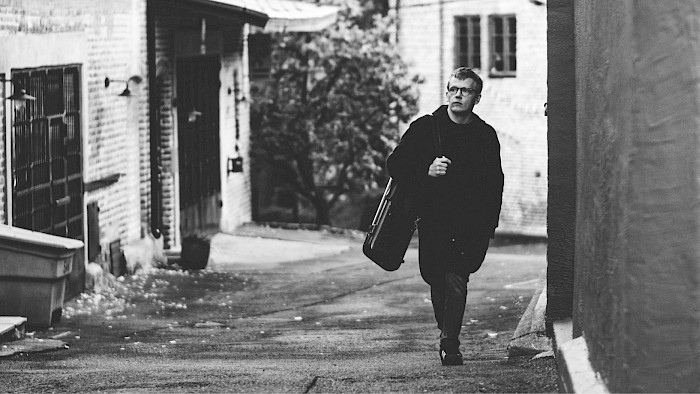
Finnish violinist Pekka Kuusisto is as idiosyncratic as he is charismatic. He electrified the Zurich audience at the Tonhalle Maag in 2019 with Jean Sibelius' "Humoresques" and Finnish folk music. He is also increasingly appearing as a conductor. Since this season, he has been Principal Guest Conductor and Artistic Co-Conductor of the Helsinki Philharmonic Orchestra.
Speaking of debuts: How have these changed since the beginning of your musical career?
JM In the early days, I hardly had any encounters with different orchestras or concert halls. I started out in opera, and at the age of 19 I became a Kapellmeister and assistant to the General Music Director in Heidelberg. It was all about learning the craft - doing, doing, doing. It wasn't easy, as I always learnt in front of an audience. But by the time someone was interested in where I was making my debut, I already had ten years of experience. I'm now lucky enough to be able to work at a very high level, with great orchestras and soloists. It is increasingly unlikely that you will have unpleasant experiences. But conversely, there are encounters where it really clicks: Those are the particularly nice moments.
PK I was lucky, there weren't many terrible collisions. When I was starting out as a young soloist, there were sometimes disagreements when an experienced maestro expected me to simply adopt his view of things. I once left before the concert because a conductor thought Hans Werner Henze's wonderful 3rd Violin Concerto was garbage; he had accepted it only because he was getting to conduct some Bruckner in the second half of the concert. Another time, a concertmaster wouldn't even shake my hand after the performance, because he thought my Mozart interpretation was too spiky. But that was a long time ago. In the meantime, I've become more flexible and the world has changed. In what way? Well, it's no longer generally accepted that geniuses are allowed to behave badly. And I have played often with conductors who are not men. I'm getting close to making a theory that there are far fewer authority disputes with women.
You recently started a new job. What are you tackling there for the first time?
JM I've been chief conductor at the Konzerthaus Berlin since this season. It has always been very open to new things - that suits me. As far as the repertoire is concerned, I'm not ruling anything out and want to cover everything from very old to contemporary music. Among other things, we are focussing on Kurt Weill this season; his symphonies are almost never played. In terms of formats, I have introduced the expedition concerts in Berlin, which I have done before: In these concerts, I am on stage with the whole orchestra and a piano and tell - not: explain! - about an important work and then play it at the end. And we've come up with the new Night Sessions, with stylistically diverse music and a guest from a completely different corner. In May, for example, I will be talking to a star chef about the topic of inspiration.
PK I've been Principal Guest Conductor and Artistic Co-Director of the Helsinki Philharmonic Orchestra since the start of this season. We have designed a new laboratory project that I am very excited about: A group of maybe twenty musicians from the orchestra will do something completely different for three weeks. We have engaged a dance choreographer and we will rent a specific room for them. It's not about putting on a performance, but simply about looking at life from a completely different place and creating something together with the colleagues. Who knows, maybe they'll bring something new with them when they return to the orchestra.
Do you like doing things for the first time?
JM People always say that the classical music business is so constant, but I don't experience it that way at all. I could spend my life doing debuts, the repertoire is inexhaustible. Especially in the position of chief conductor, every programme is new, you don't repeat yourself. On the contrary, I have to actively endeavour to perform important works on a regular basis. Mahler's Symphony No. 1, for example, is a centrepiece that I hope to conduct very often, in different places. Such works are like people you meet at different stages of your life: You get to know them anew each time.
PK We are not working in the business of artificial intelligence, but in one that has remained pretty much the same for quite a long time. In classical music, it can therefore easily happen that you become revolutionary. It's just a matter of focusing on what is very important to you. And then trying to live with the rest of it.
Translated with DeepL.com




